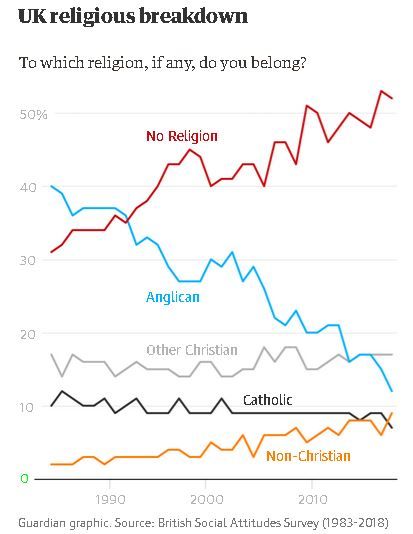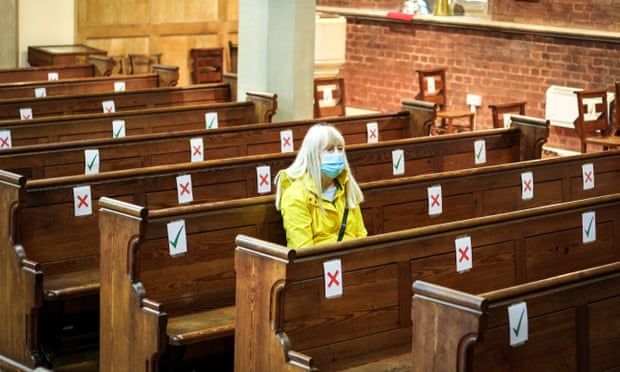
Less than half of Britons expected to tick ‘Christian’ in UK census
The “post-Christian era” in the UK will be cemented by data emerging from Sunday’s census which is expected to show further generational disengagement from organised religion, according to a leading academic.
The once-a-decade snapshot of the country has included a voluntary question about religion since 2001. In 2011, returns across England and Wales, Scotland, and Northern Ireland showed 59.3% ticking Christianity, a fall from 71.6% a decade earlier.
Abby Day, professor of race, faith and culture at Goldsmiths, University of London, expects this year’s census to show a further erosion in Christian identity, mainly because postwar generations regard the church as irrelevant and immoral.
Day predicted the proportion of people ticking Christianity “could drop below 50%”. Peter Brierley, an expert on religion statistics, said he predicted 48% or 49% identifying as Christian, but David Voas, head of the social sciences department at University College London, said he would be surprised if the figure fell below 50%.
According to Day, further decline was largely due to baby boomers – people born between 1946 and 1964 – raising their children outside the institutions of religion.
 Professor Abby Day: ‘Today’s younger generations have a different sense of soul, meaning and morality.’
Professor Abby Day: ‘Today’s younger generations have a different sense of soul, meaning and morality.’
“Religion tends to be transmitted within families. But many baby boomers, who were largely brought up by people who went to church, dramatically broke with that,” she told the Observer.
“Baby boomers have since raised a generation of millennials who don’t go to church. And people who weren’t brought up as practising Christians generally don’t become religious later in life. You don’t get many teenagers walking into churches when they haven’t been before.”
Based on recent interviews with about 50 baby boomers who were brought up in Christian families, Day said many had rejected church in favour of values considered to be more relevant, inclusive and humane.
“Post-Christians are motivated by ethics concerning gender and sexual equality, social justice, climate change and compassion. The churches failed to deliver on those moral issues and so lost moral authority.
“Today’s younger generations have a different sense of soul, meaning and morality, and it’s one that rejects the church’s record of abuse, racism, homophobia and sexism,” she said.
Advertisement
Church of England data shows that average Sunday attendance in 2019 was 600,000 adults, or fewer than 1% of the population. A third of those attending church were aged 70 or over.
Figures from the 2018 British Social Attitudes (BSA) survey showed that 52% of the UK public said they did not belong to any religion, 38% identified as Christian, and 9% identified with other faiths.

But in the last census, only 25% of the population said they had no religion. According to Voas, the difference in wording between the census question in England and Wales and the BSA question is “critical”.
“The BSA question is, ‘Do you regard yourself as belonging to a religious group?’ That notion of belonging pushes people to think, ‘Do I really belong, am I a member of a church?’… as opposed to identification with a heritage,” he told a Religion Media Centre event last week.
“The census question, ‘What is your religion?’, implies everyone should have one… You end up with very different results.”
A survey from YouGov on behalf of Humanists UK, published this month, asked people the same question as the census, but then asked those who identified as Christian the reasons for their answer.
Almost six in 10 (59%) said it was because they had been christened, and 49% because they were brought up to think of themselves as Christian. More than a quarter (26%) said it was “because this is a Christian country”. Over half (51%) said they never attended a place of worship or did so less than once a year.
Only a third (34%) said they ticked Christian because they “believe in the teachings of Christianity”.
Andrew Copson, chief executive of Humanists UK, said: “Most people in the UK say they are non-religious, a distinct minority have religious beliefs, and very few attend places of worship.” Nevertheless, a majority of people ticked a religion box in the last census because of their background or upbringing.
 ‘A distinct minority have religious beliefs,’ says Andrew Copson of Humanists UK.
‘A distinct minority have religious beliefs,’ says Andrew Copson of Humanists UK.
Humanists UK is urging people to tick the “no religion” box if they don’t believe in or practice a religion.
Day said there was a “dark side” to “cultural Christianity”. “The populist right has pushed the idea that we are a Christian country to reinforce its anti-immigration stance by fuelling rhetoric about Britain losing its identity.”
The proportion of the population identifying with non-Christian faiths was likely to increase “quite substantially” in the 2021 census as a result of immigration and higher birth rates in some minority communities, said Brierley.
The Office of National Statistics estimates it will take a year to process data from the census.
Northern Ireland was also holding a census on Sunday, but Scotland has postponed its census until 2022 because of the Covid pandemic.










